IP
-
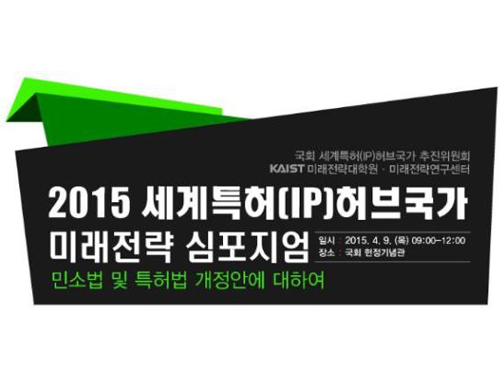 KAIST Hosts a Symposium on IPR
KAIST’s Graduate School of Future Strategy (http://futures.kaist.ac.kr) hosted a symposium entitled “Future Strategies to Grow Korea as the Hub for the World’s Intellectual Property Rights (IPRs)” under the theme of “Patent Laws and a Revised Bill for the Code of Civil Procedures” in the National Assembly’s Memorial Hall on April 9, 2015.
Experts who attended the symposium included Professor James Dator, Director of the Hawaii Research Center for Futures Studies, Sang-Wook Han, a lawyer and Vice President of Korea Intellectual Property Protection Association (KIPRA), and Min Seo, a former Chairman of Civil Law Revision Commission of the Ministry of Justice, Korea.
The event consisted of special lectures, patent law presentations, a revised bill for the code of civil procedures in patent law, and a general discussion forum. Professor Dator, the keynote speaker, addressed the future of intellectual property. San-Wook Han (KIPRA) talked about new and effective changes in Korean patent law such as the compensation against IPR violations and the reduction of legal burden of proof in IPR disputes. Min Seo from the Ministry of Justice moderated a panel of eight members, which offered an in-depth discussion on the revised bill.
A ceremony for “The Third Future Strategy Award” was also held at the symposium. Yeon-Soo Park, former Administrator of the National Emergency Management Agency, received the award for his work on the Northeast Asian International Business Center City Project which enabled the construction of Incheon International Airport and Songdo International City.
2015.04.09 View 11229
KAIST Hosts a Symposium on IPR
KAIST’s Graduate School of Future Strategy (http://futures.kaist.ac.kr) hosted a symposium entitled “Future Strategies to Grow Korea as the Hub for the World’s Intellectual Property Rights (IPRs)” under the theme of “Patent Laws and a Revised Bill for the Code of Civil Procedures” in the National Assembly’s Memorial Hall on April 9, 2015.
Experts who attended the symposium included Professor James Dator, Director of the Hawaii Research Center for Futures Studies, Sang-Wook Han, a lawyer and Vice President of Korea Intellectual Property Protection Association (KIPRA), and Min Seo, a former Chairman of Civil Law Revision Commission of the Ministry of Justice, Korea.
The event consisted of special lectures, patent law presentations, a revised bill for the code of civil procedures in patent law, and a general discussion forum. Professor Dator, the keynote speaker, addressed the future of intellectual property. San-Wook Han (KIPRA) talked about new and effective changes in Korean patent law such as the compensation against IPR violations and the reduction of legal burden of proof in IPR disputes. Min Seo from the Ministry of Justice moderated a panel of eight members, which offered an in-depth discussion on the revised bill.
A ceremony for “The Third Future Strategy Award” was also held at the symposium. Yeon-Soo Park, former Administrator of the National Emergency Management Agency, received the award for his work on the Northeast Asian International Business Center City Project which enabled the construction of Incheon International Airport and Songdo International City.
2015.04.09 View 11229 -
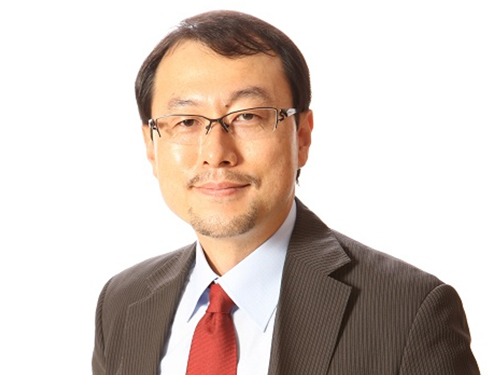 Professor Sangyong Jon Appointed Fellow of AIMBE
Professor Sangyong Jon of the Department of Biological Sciences at KAIST has been appointed a member of the American Institute for Medical and Biological Engineering (AIMBE) fellowship.
Established in 1991, AIMBE is a non-profit organization based in Washington, D.C., representing 50,000 individuals and the top 2% of medical and biological engineers. AIMBE provides policy advice and advocacy for medical and biological engineering for the benefit of humanity. It has had about 1,500 fellows over the past 25 years. Among the members, only 110 are non-American nationalities.
Following the appointment of Dr. Hae-Bang Lee, the former senior researcher at the Korean Research Institute of Chemical Technology, and Distinguished Professor Sang Yup Lee of the Department of Chemical and Biomolecular Engineering at KAIST, Professor Jon is the third Korean to become an AIMBE fellow. He had an induction ceremony for the appointment of his fellowship at the AIMBE’s Annual Event held on March 15-17, 2015 in Washington, D.C.
An authority on nanomedicine, Professor Jon has developed many original technologies including multi-functional Theranostics nano particles for the diagnosis and treatment of diseases. He received the Most Cited Paper Award from Theranostics, an academic journal specialized in nanomedicine, last February.
Additionally, Professor Jon is a leading researcher in the field of translational medicine, using a multi-disciplinary, highly collaborative, “Bench to Bedside” approach for disease treatment and prevention. He created a biotechnology venture company and transferred research developments to the industry in Korea.
2015.03.12 View 13109
Professor Sangyong Jon Appointed Fellow of AIMBE
Professor Sangyong Jon of the Department of Biological Sciences at KAIST has been appointed a member of the American Institute for Medical and Biological Engineering (AIMBE) fellowship.
Established in 1991, AIMBE is a non-profit organization based in Washington, D.C., representing 50,000 individuals and the top 2% of medical and biological engineers. AIMBE provides policy advice and advocacy for medical and biological engineering for the benefit of humanity. It has had about 1,500 fellows over the past 25 years. Among the members, only 110 are non-American nationalities.
Following the appointment of Dr. Hae-Bang Lee, the former senior researcher at the Korean Research Institute of Chemical Technology, and Distinguished Professor Sang Yup Lee of the Department of Chemical and Biomolecular Engineering at KAIST, Professor Jon is the third Korean to become an AIMBE fellow. He had an induction ceremony for the appointment of his fellowship at the AIMBE’s Annual Event held on March 15-17, 2015 in Washington, D.C.
An authority on nanomedicine, Professor Jon has developed many original technologies including multi-functional Theranostics nano particles for the diagnosis and treatment of diseases. He received the Most Cited Paper Award from Theranostics, an academic journal specialized in nanomedicine, last February.
Additionally, Professor Jon is a leading researcher in the field of translational medicine, using a multi-disciplinary, highly collaborative, “Bench to Bedside” approach for disease treatment and prevention. He created a biotechnology venture company and transferred research developments to the industry in Korea.
2015.03.12 View 13109 -
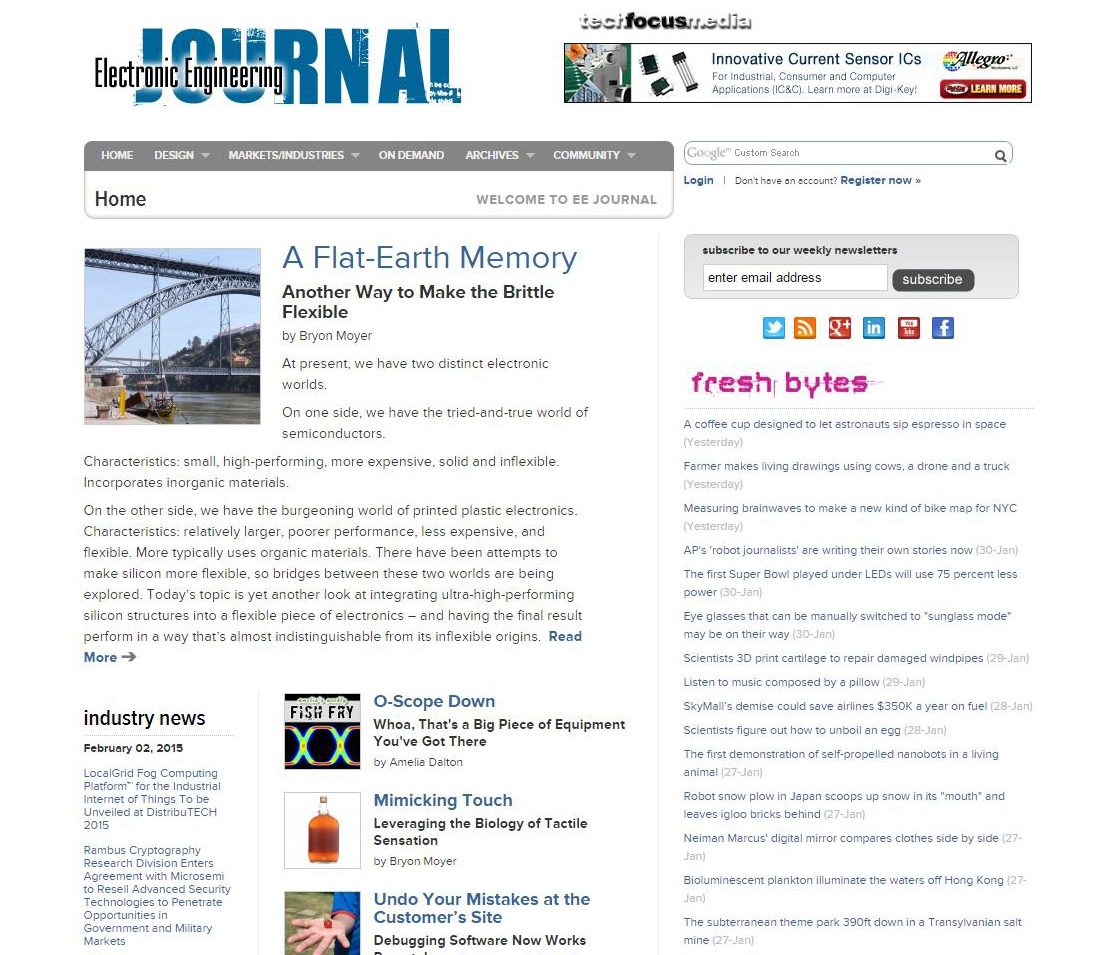 Press Release on Piezoelectric Nanogenerators of ZnO with Aluminium Nitride Stacked Layers by the American Institute of Physics
The
American Institute of Physics (AIP) released a news article entitled “Zinc
Oxide Materials Tapped for Tiny Energy Harvesting Devices” on January 13, 2015.
The
article described the research led by Professor Giwan Yoon of the
Electrical Engineering Department at KAIST. It was published in the January
12, 2015 issue of Applied Physics Letters.
AIP publishes the journal. For the news release, please visit the
link below:
The American
Institute of Physics, January 13, 2015
“Zinc
Oxide Materials Tapped for Tiny Energy Harvesting Devices”
New research helps
pave the way toward highly energy-efficient zinc oxide-based micro energy
harvesting devices with applications in portable communications, healthcare and
environmental monitoring, and more
http://www.aip.org/publishing/journal-highlights/zinc-oxide-materials-tapped-tiny-energy-harvesting-devices
2015.02.04 View 33354
Press Release on Piezoelectric Nanogenerators of ZnO with Aluminium Nitride Stacked Layers by the American Institute of Physics
The
American Institute of Physics (AIP) released a news article entitled “Zinc
Oxide Materials Tapped for Tiny Energy Harvesting Devices” on January 13, 2015.
The
article described the research led by Professor Giwan Yoon of the
Electrical Engineering Department at KAIST. It was published in the January
12, 2015 issue of Applied Physics Letters.
AIP publishes the journal. For the news release, please visit the
link below:
The American
Institute of Physics, January 13, 2015
“Zinc
Oxide Materials Tapped for Tiny Energy Harvesting Devices”
New research helps
pave the way toward highly energy-efficient zinc oxide-based micro energy
harvesting devices with applications in portable communications, healthcare and
environmental monitoring, and more
http://www.aip.org/publishing/journal-highlights/zinc-oxide-materials-tapped-tiny-energy-harvesting-devices
2015.02.04 View 33354 -
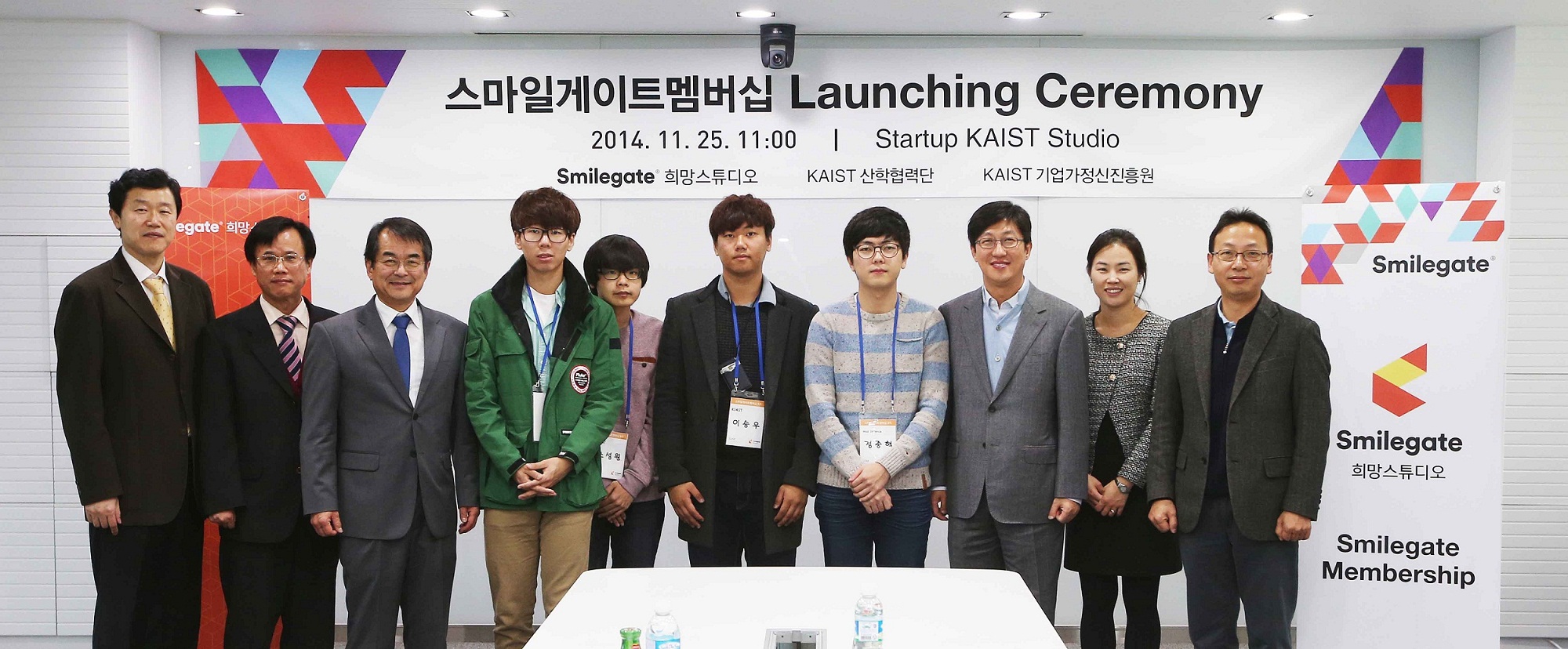 SmileGate Membership Program for Students and Video Game Industry in Korea
The Office of University and Industry Cooperation at KAIST and SmileGate, a video game developer based in Korea, agreed in June 2014 to cooperate in the development of talents for the video game industry in Korea and to support students’ startup efforts.
The company established the SmileGate Studio at the KAIST campus in 2010 and has been supporting KAIST students who are interested in video game design and development, such as hosting design competitions and offering networking opportunities as well as consulting services for startups.
The Studio launched a scholarship program called the “SmileGate Membership” in November this year to offer 12 students research funding, equipment and tools for game design and development, and mentoring services for eight months. Participating students will also receive free space for research and development, legal services for business development, investment advice, and assistance in networking with the global community after the completion of the program.
Professor Joongmyeon Bae, the Dean of the KAIST Office of University and Industry Cooperation, said, “This is a great opportunity for our students because they can actually utilize their passion and creativity to make their own games. KAIST and SmileGate will continue to lead the video game industry in Korea through close collaboration.”
2014.12.03 View 8979
SmileGate Membership Program for Students and Video Game Industry in Korea
The Office of University and Industry Cooperation at KAIST and SmileGate, a video game developer based in Korea, agreed in June 2014 to cooperate in the development of talents for the video game industry in Korea and to support students’ startup efforts.
The company established the SmileGate Studio at the KAIST campus in 2010 and has been supporting KAIST students who are interested in video game design and development, such as hosting design competitions and offering networking opportunities as well as consulting services for startups.
The Studio launched a scholarship program called the “SmileGate Membership” in November this year to offer 12 students research funding, equipment and tools for game design and development, and mentoring services for eight months. Participating students will also receive free space for research and development, legal services for business development, investment advice, and assistance in networking with the global community after the completion of the program.
Professor Joongmyeon Bae, the Dean of the KAIST Office of University and Industry Cooperation, said, “This is a great opportunity for our students because they can actually utilize their passion and creativity to make their own games. KAIST and SmileGate will continue to lead the video game industry in Korea through close collaboration.”
2014.12.03 View 8979 -
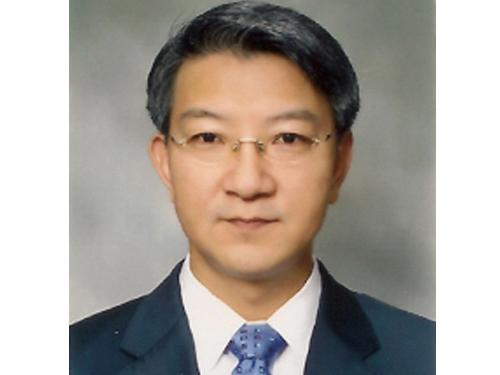 Distinguished Professor Sang Yup Lee Accepts an Honorary Professorship at Beijing University of Chemical Technology
Distinguished Professor Sang Yup Lee of the Department of Chemical and Biomolecular Engineering at KAIST has been appointed an honorary professor at Beijing University of Chemical Technology (BUCT). Founded in 1958, BUCT is one of the outstanding universities in mainland China, especially in chemistry studies.
In addition to the Chinese Academy of Sciences (2012), Shanghai Jiao Tong University (2013), Wuhan University (2014), and Hebei University of Technology (2014), this is the fifth honorary professorship Professor Lee has received from higher education institutions in China.
Professor Lee was recognized for his pioneering research in systems metabolic engineering of microorganisms necessary for the development of green chemical industries. He succeeded in producing succinic acid through bacterial fermentation and engineering plastic raw materials in the most effective and economical method for the first time in the world. Professor Lee also developed polylactic acid, a bio-based polymer that allows plastics to be produced through natural and renewable resources, as well as the microbial production of alkanes, an alternative to gasoline that can be produced from fatty acids.
Professor Lee has been actively working as a member of a group of global leaders supported by the World Economic Forum (WEF), serving as the Chairman of the Future of Chemicals, Advanced Materials & Biotechnology, Global Agenda Councils, WEF.
2014.11.13 View 12210
Distinguished Professor Sang Yup Lee Accepts an Honorary Professorship at Beijing University of Chemical Technology
Distinguished Professor Sang Yup Lee of the Department of Chemical and Biomolecular Engineering at KAIST has been appointed an honorary professor at Beijing University of Chemical Technology (BUCT). Founded in 1958, BUCT is one of the outstanding universities in mainland China, especially in chemistry studies.
In addition to the Chinese Academy of Sciences (2012), Shanghai Jiao Tong University (2013), Wuhan University (2014), and Hebei University of Technology (2014), this is the fifth honorary professorship Professor Lee has received from higher education institutions in China.
Professor Lee was recognized for his pioneering research in systems metabolic engineering of microorganisms necessary for the development of green chemical industries. He succeeded in producing succinic acid through bacterial fermentation and engineering plastic raw materials in the most effective and economical method for the first time in the world. Professor Lee also developed polylactic acid, a bio-based polymer that allows plastics to be produced through natural and renewable resources, as well as the microbial production of alkanes, an alternative to gasoline that can be produced from fatty acids.
Professor Lee has been actively working as a member of a group of global leaders supported by the World Economic Forum (WEF), serving as the Chairman of the Future of Chemicals, Advanced Materials & Biotechnology, Global Agenda Councils, WEF.
2014.11.13 View 12210 -
 The 2014 SoC Robot Competition Took Place
Professor Hoi-Jun Yoo of the Department of Electrical Engineering at KAIST and his research team hosted a competition for miniature robots with artificial intelligence at KINTEX in Ilsan, Korea, on October 23-26, 2014.
The competition, called the 2014 SoC Robot War, showed the latest developments of semiconductor and robot technology through the robots’ presentations of the Korean martial art, Taekwondo, and hurdles race. SoC is a system on ship, an integrated circuit that holds all components of a computer or other electronic systems in a single chip. SoC robots are equipped with an artificial intelligence system, and therefore, can recognize things on their own or respond automatically to environmental changes. SoC robots are developed with the integration of semiconductor technology and robotics engineering.
Marking the thirteenth competition this year since its inception, the Robot War featured two competitions between HURO and Taekwon Robots. Under the HURO competition, participating robots were required to run a hurdle race, pass through barricades, and cross a bridge. The winning team received an award from the president of the Republic of Korea. Robots participating in the Taekwon Robot competition performed some of the main movements of Taekwondo such as front and side kicks and fist techniques. The winning team received an award from the prime minster of the Republic of Korea.
A total of 105 teams with 530 students and researchers from different universities across the country participated in preliminaries, and 30 teams qualified for the final competition.
2014.10.27 View 9014
The 2014 SoC Robot Competition Took Place
Professor Hoi-Jun Yoo of the Department of Electrical Engineering at KAIST and his research team hosted a competition for miniature robots with artificial intelligence at KINTEX in Ilsan, Korea, on October 23-26, 2014.
The competition, called the 2014 SoC Robot War, showed the latest developments of semiconductor and robot technology through the robots’ presentations of the Korean martial art, Taekwondo, and hurdles race. SoC is a system on ship, an integrated circuit that holds all components of a computer or other electronic systems in a single chip. SoC robots are equipped with an artificial intelligence system, and therefore, can recognize things on their own or respond automatically to environmental changes. SoC robots are developed with the integration of semiconductor technology and robotics engineering.
Marking the thirteenth competition this year since its inception, the Robot War featured two competitions between HURO and Taekwon Robots. Under the HURO competition, participating robots were required to run a hurdle race, pass through barricades, and cross a bridge. The winning team received an award from the president of the Republic of Korea. Robots participating in the Taekwon Robot competition performed some of the main movements of Taekwondo such as front and side kicks and fist techniques. The winning team received an award from the prime minster of the Republic of Korea.
A total of 105 teams with 530 students and researchers from different universities across the country participated in preliminaries, and 30 teams qualified for the final competition.
2014.10.27 View 9014 -
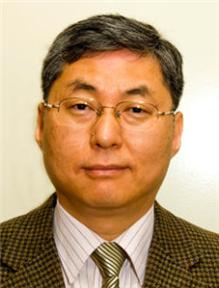 Kiseok Song, a Ph.D. candidate in the Electrical Engineering Department, receives the 2014 Marconi Society Young Scholar Award
Established
in 1974 to commemorate the eminent Italian inventor and electrical engineer,
Guglielmo Marconi, the Marconi Society has recognized significant contributions
in science and technology by awarding the Marconi Prize, with an annual USD
100,000 grant, to a living scientist who has made great advancements in
communications technology.
Along
with the Marconi Prize, the Society has been presenting the Young Scholars
Awards over the past six years to reward young and emerging scientists’ brilliant
academic and research achievements as well as their entrepreneurship. For this
year’s seventh Young Scholar Awards, a KAIST doctoral student was selected as
one of the two recipients.
Kiseok
Song, a Ph.D. candidate in the Department of Electrical Engineering, KAIST, has
been named as a 2014 Marconi Society Paul Baran Young Scholar. The Marconi Society said that Song was being recognized for "his
academic achievements and leadership in the field of communications and
information science,” according to a press release distributed by the Society on August 28, 2014.
Studying
under the advice of Professor Hoi-Jun Yoo of the Department of Electrical
Engineering at KAIST, Song has developed bio-medical System on a Chip (SoC)
such as smart wireless bio-medical systems combined with optimized SoCs,
compact bio-medical patch systems connected to smart phones, smart electro-acupuncture
and transdermal drug delivery, and multi-modal non-invasive glucose monitors.
The
press release quoted Professor Yoo’s comment on the meaning of Song’s research:
“All
of these bio-medical systems open a new healthcare paradigm to improve people’s
quality of life in combination with the current mobile smart phones.”
In
addition to Song, Himanshu Asnani, a Stanford Ph.D. candidate and system engineer
at Ericsson Silicon Valley, received the other award. The award
ceremony will be held at the Marconi Society’s annual award gala at the
National Academies of Science Building in Washington D.C., on October 2, 2014.
For
details, please read the following press release:
The
Marconi Society, Press Release, August 28, 2014
“Kiseok
Song Receives the 2014 Marconi Society Young Scholar Award”
http://www.marconisociety.org/press/2014Song.html
2014.09.08 View 9217
Kiseok Song, a Ph.D. candidate in the Electrical Engineering Department, receives the 2014 Marconi Society Young Scholar Award
Established
in 1974 to commemorate the eminent Italian inventor and electrical engineer,
Guglielmo Marconi, the Marconi Society has recognized significant contributions
in science and technology by awarding the Marconi Prize, with an annual USD
100,000 grant, to a living scientist who has made great advancements in
communications technology.
Along
with the Marconi Prize, the Society has been presenting the Young Scholars
Awards over the past six years to reward young and emerging scientists’ brilliant
academic and research achievements as well as their entrepreneurship. For this
year’s seventh Young Scholar Awards, a KAIST doctoral student was selected as
one of the two recipients.
Kiseok
Song, a Ph.D. candidate in the Department of Electrical Engineering, KAIST, has
been named as a 2014 Marconi Society Paul Baran Young Scholar. The Marconi Society said that Song was being recognized for "his
academic achievements and leadership in the field of communications and
information science,” according to a press release distributed by the Society on August 28, 2014.
Studying
under the advice of Professor Hoi-Jun Yoo of the Department of Electrical
Engineering at KAIST, Song has developed bio-medical System on a Chip (SoC)
such as smart wireless bio-medical systems combined with optimized SoCs,
compact bio-medical patch systems connected to smart phones, smart electro-acupuncture
and transdermal drug delivery, and multi-modal non-invasive glucose monitors.
The
press release quoted Professor Yoo’s comment on the meaning of Song’s research:
“All
of these bio-medical systems open a new healthcare paradigm to improve people’s
quality of life in combination with the current mobile smart phones.”
In
addition to Song, Himanshu Asnani, a Stanford Ph.D. candidate and system engineer
at Ericsson Silicon Valley, received the other award. The award
ceremony will be held at the Marconi Society’s annual award gala at the
National Academies of Science Building in Washington D.C., on October 2, 2014.
For
details, please read the following press release:
The
Marconi Society, Press Release, August 28, 2014
“Kiseok
Song Receives the 2014 Marconi Society Young Scholar Award”
http://www.marconisociety.org/press/2014Song.html
2014.09.08 View 9217 -
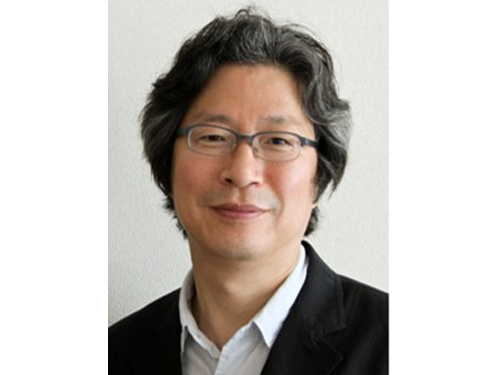 The Journal of Clinical Investigation: Researchers Uncover the Secret Lymphatic Identity of the Schlemm's Canal
The Journal of Clinical Investigation (JCI), a peer-reviewed, top-tier medical journal published by the American Society for Clinical Investigation, carried a commentary entitled “Schlemm’s Canal: More Than Meets the Eye, Lymphatics in Disguise” in the July 25, 2014 issue.
In the commentary, the authors compared a research paper (“Lymphatic regular PROX1 determines Schlemm’s canal integrity and identity”) by Professor Gou-Young Koh of the Graduate School of Medical Science and Engineering at KAIST with research work from the University of Helsinki (article entitled “The Schlemm’s canal is a VEGF-C/VEGFR-3 responsive lymphatic-like vessel”).
The JCI released a press statement dated July 25, 2014 on its commentary. It mentioned that glaucoma, one of the leading causes of blindness worldwide, elevates eye pressure owing to poor drainage of aqueous humor. A specialized structure called “Schlemm’s canal” funnels aqueous humor from the eye back into circulation, which is critical to prevent pressure buildup in the eye. The article discussed the role of Schlemm’s canal in the context of lymphatic vascular characteristics by reviewing two research group’s papers back-to-back.
For the full text of the press release, please visit the link below:
Press Release from the Journal of Clinical Investigation, July 25, 2014
“Researchers uncover the secret lymphatic identity of the Schlemm’s canal”
http://www.eurekalert.org/pub_releases/2014-07/joci-rut072414.php
2014.07.28 View 8739
The Journal of Clinical Investigation: Researchers Uncover the Secret Lymphatic Identity of the Schlemm's Canal
The Journal of Clinical Investigation (JCI), a peer-reviewed, top-tier medical journal published by the American Society for Clinical Investigation, carried a commentary entitled “Schlemm’s Canal: More Than Meets the Eye, Lymphatics in Disguise” in the July 25, 2014 issue.
In the commentary, the authors compared a research paper (“Lymphatic regular PROX1 determines Schlemm’s canal integrity and identity”) by Professor Gou-Young Koh of the Graduate School of Medical Science and Engineering at KAIST with research work from the University of Helsinki (article entitled “The Schlemm’s canal is a VEGF-C/VEGFR-3 responsive lymphatic-like vessel”).
The JCI released a press statement dated July 25, 2014 on its commentary. It mentioned that glaucoma, one of the leading causes of blindness worldwide, elevates eye pressure owing to poor drainage of aqueous humor. A specialized structure called “Schlemm’s canal” funnels aqueous humor from the eye back into circulation, which is critical to prevent pressure buildup in the eye. The article discussed the role of Schlemm’s canal in the context of lymphatic vascular characteristics by reviewing two research group’s papers back-to-back.
For the full text of the press release, please visit the link below:
Press Release from the Journal of Clinical Investigation, July 25, 2014
“Researchers uncover the secret lymphatic identity of the Schlemm’s canal”
http://www.eurekalert.org/pub_releases/2014-07/joci-rut072414.php
2014.07.28 View 8739 -
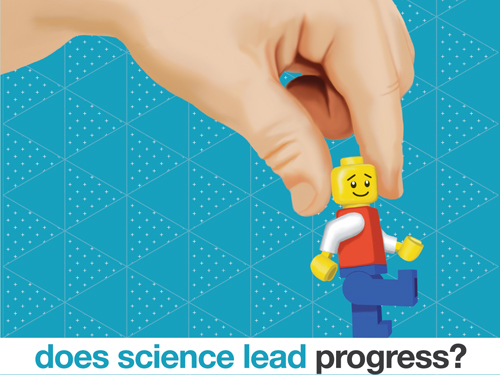 The ICISTS-KAIST International Conference from August 4-8, 2014 in KAIST Campus, Korea
"Does science lead progress?"
This thought-provoking question will be explored this summer with hundreds of university students gathered from all around the world at the campus of the Korea Advanced Institute of Science and Technology (KAIST), a leading science and technology university in Korea.
Established in 2005, the International Conference for Integration of Science, Technology and Society (ICISTS)-KAIST has been hosted every summer for Korean and international university students in Daejeon, Republic of Korea. The conference features distinguished speakers from academia, business, and public sectors and enables participants to exchange views, identify issues affecting science and society, and explore possible solutions.
The ICISTS-KAIST is the largest interdisciplinary conference in Asia. It is organized by undergraduate students of KAIST and promotes the idea of a science- and technology-integrated society through international cooperation of college students from diverse backgrounds. Last year alone, about 400 participants from 103 universities in 25 countries attended the conference.
Marking the 10th anniversary, the ICISTS-KAIST International Conference 2014 will scrutinize the fundamental aspect of scientific and technological progress versus social advancement under the theme of "Does Science Lead Progress?"
"We hope that the conference provides students with an interactive platform to look into some of the essential, yet easily neglected, questions such as the purpose of science and technology education in a broader context of social values," said Dong-Yeon Woo, President of Organizing Committee for the ICISTS-KAIST International Conference 2014.
Among keynote speakers are Langdon Winner, a professor of Science and Technology Studies at Rensselaer Polytechnic Institute, Stephen Hilgartner, an associate professor of Science and Technology Studies at Cornell University, and Steve Breyman, an associate professor of Science and Technology Studies at Rensselaer Polytechnic Institute.
Langdon Winner will speak about the fallacy of the public perception that technological innovation leads to social revolution (his presentation is entitled "The Myth of Innovation"). Stephen Hilgartner will present four aspects of the politics of vision in today's science and technology ("Science, Technology, and the Politics of Vision"), and Steve Breyman will talk about the origin of scientific deception, misrepresentation, and prevarication ("The Agnotology of Hydrofracking").
The conference lasts five days, beginning on August 4th through August 8th, 2014 at KAIST campus. For participation, regular online application opens until July 11, 2014 at http://www.icists.org.
2014.07.04 View 10163
The ICISTS-KAIST International Conference from August 4-8, 2014 in KAIST Campus, Korea
"Does science lead progress?"
This thought-provoking question will be explored this summer with hundreds of university students gathered from all around the world at the campus of the Korea Advanced Institute of Science and Technology (KAIST), a leading science and technology university in Korea.
Established in 2005, the International Conference for Integration of Science, Technology and Society (ICISTS)-KAIST has been hosted every summer for Korean and international university students in Daejeon, Republic of Korea. The conference features distinguished speakers from academia, business, and public sectors and enables participants to exchange views, identify issues affecting science and society, and explore possible solutions.
The ICISTS-KAIST is the largest interdisciplinary conference in Asia. It is organized by undergraduate students of KAIST and promotes the idea of a science- and technology-integrated society through international cooperation of college students from diverse backgrounds. Last year alone, about 400 participants from 103 universities in 25 countries attended the conference.
Marking the 10th anniversary, the ICISTS-KAIST International Conference 2014 will scrutinize the fundamental aspect of scientific and technological progress versus social advancement under the theme of "Does Science Lead Progress?"
"We hope that the conference provides students with an interactive platform to look into some of the essential, yet easily neglected, questions such as the purpose of science and technology education in a broader context of social values," said Dong-Yeon Woo, President of Organizing Committee for the ICISTS-KAIST International Conference 2014.
Among keynote speakers are Langdon Winner, a professor of Science and Technology Studies at Rensselaer Polytechnic Institute, Stephen Hilgartner, an associate professor of Science and Technology Studies at Cornell University, and Steve Breyman, an associate professor of Science and Technology Studies at Rensselaer Polytechnic Institute.
Langdon Winner will speak about the fallacy of the public perception that technological innovation leads to social revolution (his presentation is entitled "The Myth of Innovation"). Stephen Hilgartner will present four aspects of the politics of vision in today's science and technology ("Science, Technology, and the Politics of Vision"), and Steve Breyman will talk about the origin of scientific deception, misrepresentation, and prevarication ("The Agnotology of Hydrofracking").
The conference lasts five days, beginning on August 4th through August 8th, 2014 at KAIST campus. For participation, regular online application opens until July 11, 2014 at http://www.icists.org.
2014.07.04 View 10163 -
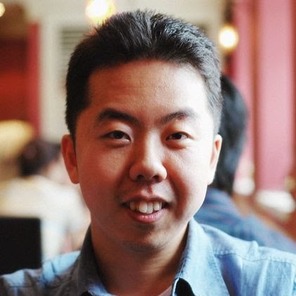 A KAIST graduate named one of seven Microsoft Research Faculty Fellows for 2014
Yong-Yeol Ahn, a professor of the School of Informatics and Computing, Indiana University Bloomington (IUB), has been selected as one of the seven winners for the Microsoft Research Faculty Fellowship 2014. He received his Ph.D. in 2008 from KAIST.
Each year, since 2005, Microsoft Research has recognized innovative, promising new faculty members in computer science from a number of research institutions to join the ranks of Microsoft Research Faculty Fellows. The winners are awarded $200,000 grants to further advance their research.
For details, below please see a press release issued by IUB on June 12, 2014.
IU Bloomington Newsroom
Press Release, June 12, 2014
IU informaticist Y.Y. Ahn named one of seven Microsoft Research Faculty Fellows
http://news.indiana.edu/releases/iu/2014/06/yy-ahn-microsoft-research-faculty-fellow.shtml
2014.06.15 View 8577
A KAIST graduate named one of seven Microsoft Research Faculty Fellows for 2014
Yong-Yeol Ahn, a professor of the School of Informatics and Computing, Indiana University Bloomington (IUB), has been selected as one of the seven winners for the Microsoft Research Faculty Fellowship 2014. He received his Ph.D. in 2008 from KAIST.
Each year, since 2005, Microsoft Research has recognized innovative, promising new faculty members in computer science from a number of research institutions to join the ranks of Microsoft Research Faculty Fellows. The winners are awarded $200,000 grants to further advance their research.
For details, below please see a press release issued by IUB on June 12, 2014.
IU Bloomington Newsroom
Press Release, June 12, 2014
IU informaticist Y.Y. Ahn named one of seven Microsoft Research Faculty Fellows
http://news.indiana.edu/releases/iu/2014/06/yy-ahn-microsoft-research-faculty-fellow.shtml
2014.06.15 View 8577 -
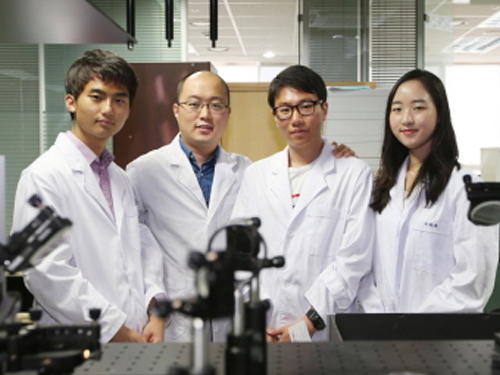 Professor YongKeun Park Produces Undergraduate Students with International Achievements
Three undergraduate students under the supervision of Professor YongKeun Park from the Department of Physics, KAIST, have published papers in globally renowned academic journals.
The most recent publication was made by YoungJu Jo, a senior in physics. Jo’s paper entitled “Angle-resolved light scattering of individual rod-shaped bacteria based on Fourier transform light scattering” was published in the May 28th edition of Scientific Reports.
Analyzing bacteria is a very important task in the field of health and food hygiene, but using the conventional biochemical methods of analysis takes days. However, observation with Jo’s newly developed method using light scattering analyzes bacteria within a matter of seconds.
SangYeon Cho from the Department of Chemistry also published papers in Cell (2012) and Nature (2013), respectively, under the guidance of Professor Park. SangYeon Cho’s outstanding research achievements were recognized by Harvard and MIT. He was accepted with a full scholarship to Harvard-MIT Health Sciences and Technology Graduate School. He will begin his graduate studies at Harvard-MIT this September.
Last March, SeoEun Lee from the Department of Biology was the recipient of the Best Paper Award by the Optical Society of Korea. She plans to pursue a doctoral degree at the College of Physicians and Surgeons, Columbia University in New York.
Professor Park said, “Undergraduate students, who are learning a variety of subjects concurrently, are at the most creative time of their lives. KAIST has offered many opportunities to undergraduate students to partake in various research programs.”
- Picture (a) and (b): Rod-shaped bacteria’s phase image and light-scattering patterns
- Picture (c): Quantitative analysis to illustrate the extraction of information from bacteria
2014.06.03 View 13679
Professor YongKeun Park Produces Undergraduate Students with International Achievements
Three undergraduate students under the supervision of Professor YongKeun Park from the Department of Physics, KAIST, have published papers in globally renowned academic journals.
The most recent publication was made by YoungJu Jo, a senior in physics. Jo’s paper entitled “Angle-resolved light scattering of individual rod-shaped bacteria based on Fourier transform light scattering” was published in the May 28th edition of Scientific Reports.
Analyzing bacteria is a very important task in the field of health and food hygiene, but using the conventional biochemical methods of analysis takes days. However, observation with Jo’s newly developed method using light scattering analyzes bacteria within a matter of seconds.
SangYeon Cho from the Department of Chemistry also published papers in Cell (2012) and Nature (2013), respectively, under the guidance of Professor Park. SangYeon Cho’s outstanding research achievements were recognized by Harvard and MIT. He was accepted with a full scholarship to Harvard-MIT Health Sciences and Technology Graduate School. He will begin his graduate studies at Harvard-MIT this September.
Last March, SeoEun Lee from the Department of Biology was the recipient of the Best Paper Award by the Optical Society of Korea. She plans to pursue a doctoral degree at the College of Physicians and Surgeons, Columbia University in New York.
Professor Park said, “Undergraduate students, who are learning a variety of subjects concurrently, are at the most creative time of their lives. KAIST has offered many opportunities to undergraduate students to partake in various research programs.”
- Picture (a) and (b): Rod-shaped bacteria’s phase image and light-scattering patterns
- Picture (c): Quantitative analysis to illustrate the extraction of information from bacteria
2014.06.03 View 13679 -
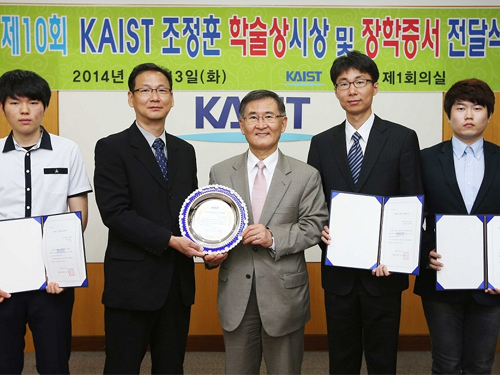 Dr. Sung-Gu Kim of KARI receives the 10th KAIST Jung-Hun Cho Academic Award
KAIST President Steve Kang awarded the 10th "KAIST Jung-Hun Cho Academic Award" to Dr. Sung-Gu Kim of Korea Aerospace Research Institute (KARI) along with Byeong-Sup Park, a graduate student of KAIST Aerospace Engineering, Hee-Won Chae of Korea University, and Jin-Hyung Noh of Kongju National University High School on May 13, 2014.
Dr. Sung-Gu Kim was recognized for his development of a 30-ton class reproduction cooling burner and the securing of essential factor technology for liquid-fuel rocket engines on the Naro project.
The KAIST Jung-Hun Cho Academic Award was established to commemorate Jung-Hun Cho who was killed while researching in the rocket laboratory on May 13, 2003. From 2005, young scientists from the Aerospace Engineering field have been recognized every year. One student each from KAIST, Korea University, and Kongju National University High School, where the honorary doctorate Dr. Cho attended, has been chosen as a scholarship recipient.
The KAIST Jung-Hun Cho Academic Award was established with USD 460,000 in funds donated from Cho's family.
2014.05.17 View 10215
Dr. Sung-Gu Kim of KARI receives the 10th KAIST Jung-Hun Cho Academic Award
KAIST President Steve Kang awarded the 10th "KAIST Jung-Hun Cho Academic Award" to Dr. Sung-Gu Kim of Korea Aerospace Research Institute (KARI) along with Byeong-Sup Park, a graduate student of KAIST Aerospace Engineering, Hee-Won Chae of Korea University, and Jin-Hyung Noh of Kongju National University High School on May 13, 2014.
Dr. Sung-Gu Kim was recognized for his development of a 30-ton class reproduction cooling burner and the securing of essential factor technology for liquid-fuel rocket engines on the Naro project.
The KAIST Jung-Hun Cho Academic Award was established to commemorate Jung-Hun Cho who was killed while researching in the rocket laboratory on May 13, 2003. From 2005, young scientists from the Aerospace Engineering field have been recognized every year. One student each from KAIST, Korea University, and Kongju National University High School, where the honorary doctorate Dr. Cho attended, has been chosen as a scholarship recipient.
The KAIST Jung-Hun Cho Academic Award was established with USD 460,000 in funds donated from Cho's family.
2014.05.17 View 10215